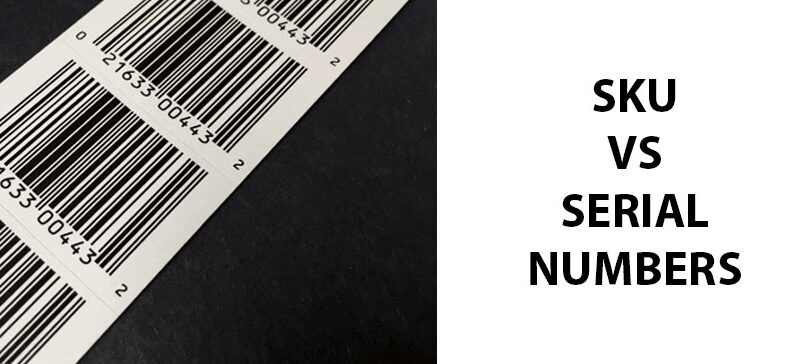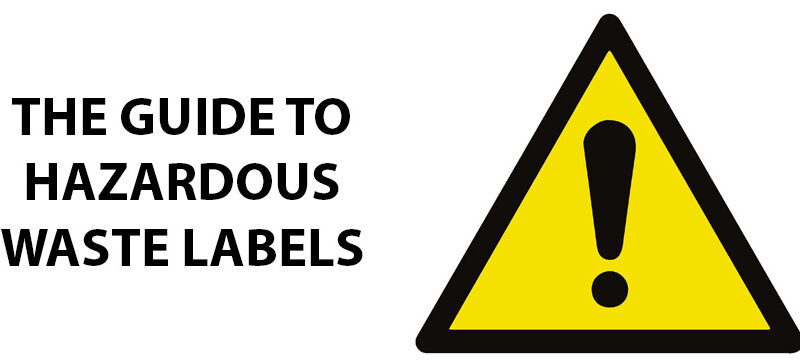When it comes to managing inventory, both SKUs and serial numbers are essential. But how does an SKU vs serial number compare? And are they the same?
In short, each has a unique function. SKUs are used by retailers and warehouses to keep track of inventory. They refer to specific variants of products, such as different colors or sizes, and help with managing stock levels. Serial numbers, on the other hand, are used to track individual units of identical products. They can be used to authenticate products, check warranties, and track repairs.
In this guide, we’ll compare the similarities and differences between an SKU and a serial number. Plus, we’ll talk about some of the benefits of using SKUs and serial numbers as well as how to best use them.
What is an SKU?
An SKU, or Stock Keeping Unit, is a unique identifier used by retailers, manufacturers, and warehouses to track and manage products. SKUs use a combination of numbers and letters to distinguish different products based on characteristics like brand, size, and color.
For example, a retailer might use SDL-BK-7 to stand for Sandal Black Size 7. Those same sandals in red might use the SKU SDL-RD-7. SKUs are essential for inventory management, making it easier to organize stock, track sales, and manage orders. SKUs are often encoded into barcodes for quick scanning during inventory counts, POS sales, reordering, and more.
What Is a Serial Number?
A serial number is a unique identifier assigned to an individual product during manufacturing. It helps distinguish that specific item from others of the same model or batch. Unlike an SKU, which identifies a type of product, a serial number is unique to one particular unit. This allows that product to be tracked through its lifecycle.
For example, when a company produces thousands of units of the exact same laptop, each unit receives its own serial number. In the case of a warranty claim, the company can check the serial number to see if the laptop is still under warranty. Customers can also check the serial number to ensure that the laptop they’re buying isn’t counterfeit.
Serial numbers are used on products like electronics, cars, and other high-value items. They are often used for warranty claims, quality control and tracking defects, theft protection and identification, counterfeit protection, and service records for repairs and maintenance.
Is an SKU the Same as a Serial Number?
No, an SKU is not the same as a serial number. When it comes to SKU vs serial number, each serves a distinct purpose.
- SKUs are used for managing and identifying product types (for example, blue 17 inch laptops). Stores track SKUs to make better decisions about managing their inventory.
- Serial numbers are used for tracking individual units (for example, one specific laptop from the batch). They can be used to manage warranties and recalls and to authenticate products.
Similarities
Though used for unique purposes, SKUs and serial numbers are both types of identifiers used in inventory management. Here are some of the similarities of an SKU vs serial number:
- Identification: Both are used to uniquely identify products in a system and differentiate items within the inventory.
- Tracking: Both can be used to track products through the supply chain. SKUs help track inventory levels of product types, while serial numbers track specific products.
- Logistics: SKUs and serial numbers are both crucial in logistics. They ensure that the right products are available, shipped, and accounted for.
Differences
When comparing an SKU vs serial number, there are some major differences. Here’s a breakdown of how the two identifiers are different from one another:
- Purpose: SKUs identify a product type or category within an inventory system, such as a specific size, color, or model. Serial numbers identify a specific, individual item. This helps with warranties, repairs, and recalls.
- Uniqueness: SKUs are not unique to each item. All items with the same attributes, such as all red, size 9 Nike running shoes, have the same SKU. Serial numbers are unique to each individual item. For example, each phone that is manufactured has its own serial number.
- Inventory tracking: SKUs are used to manage and track inventory of similar products. Serial numbers are used to track individual units.
- Structure: SKUs are usually alphanumeric codes that are structured to convey product details. Businesses customize how they use SKUs as there is no standard for SKU creation. Serial numbers encode information like the manufacturing date, batch number, and location. Once a manufacturer assigns a serial number, it stays attached to that specific product for its life.
- Authentication: SKUs are not used at all to authenticate products. Serial numbers can be used to check the authenticity of a product to prevent counterfeiting and fraud.
- Detail: Because SKUs are used for product types or categories, the information included is very broad. Serial numbers, on the other hand, include much more detailed information to track individual products through their life cycles.
How to Use SKUs
SKUs are essential for inventory management, sales tracking, and overall business efficiency. But in order to reap the benefits, you need to follow a few key steps to make sure they’re actually useful for your organization. Here’s how to use SKUs in your business:
- Create a logical SKU format for your organization. There is no global standard for creating SKUs, which gives you leeway to create your own format. However, you’ll still want to be consistent. For example, you might always start with the product category, followed by size, color, and other characteristics. Use only numbers and letters, avoiding special characters like #, &, or %. Stay consistent with the abbreviations you use.
- Assign SKUs to all products in your inventory. Every variation should have its own SKU. For example, if you sell the same shoes in different sizes and colors, each size/color combination needs its own SKU. Keep similar product categories grouped by using consistent prefixes, such as APP for apparel and ELEC for electronics.
- Use SKUs in your inventory management system. Input every product SKU into the software. Your system should update stock quantities when items are sold, received, or returned, all based on their SKUs.
- Use SKUs for order fulfillment. SKUs can help warehouse staff quickly locate the right items. Integrate your SKUs with barcodes to speed up scanning and avoid errors during picking and packing.
- Track sales by SKU. This allows you to easily analyze which specific products or variants are selling well by their SKUs so you can adjust stock levels accordingly.
- Use SKUs to restock specific items when inventory levels are low. SKUs allow for accurate physical counts and tracking and reduce errors in stock levels. By tracking SKUs, you can avoid overstocking or understocking.
How to Use Serial Numbers
Using an SKU vs serial number is quite different. Like SKUs, there is no universal method for creating serial numbers for your products. However, it can be a big task assigning unique serial numbers to every individual product. Here are some tips for how to use serial numbers in your organization:
- Every single unit needs its own serial number. Usually, the manufacturer generates the serial numbers. You can use an online serial number generator or use a spreadsheet formula to create them.
- Each unit needs to have a physical label with its serial number. Use either durable labels or engravings so the serial numbers stay visible for the product’s lifetime. Encoding the serial number into a barcode format will make tracking easier.
- Track all serial numbers in a database, such as your product management, inventory, or warranty system. Include details like the model, date of manufacture, and other relevant info. For high-value items or items with a warranty, record the serial number along with the customer’s information.
- Use serial numbers to verify whether or not the product is still under warranty. Track repairs and maintenance with the serial number, and use the serial number when a customer makes a warranty claim.
- In cases of defects or recalls, you can use serial numbers to target specific items produced in a certain timeframe or batch.
- Serial numbers also help fight counterfeiting. You can verify the authenticity of products and identify counterfeit or stolen items.
Benefits of SKUS
SKUs are used in retail settings and warehouses across the world. They come with tons of benefits, including:
- Accurate inventory management: SKUs allow businesses to track inventory down to specific product variants so that you always know how much of each item is available. They simplify counts and make it easier to reconcile with digital systems.
- Faster order fulfillment: SKUs help warehouse and retail staff quickly identify specific products for order fulfillment. This also reduces errors by ensuring the right product is picked.
- Improved sales tracking: Tracking the sales data of SKUs helps you to analyze which products and variants are top sellers and make better decisions about stocking and promotion.
- Easier returns: SKUs make it easier to handle returns and exchanges by identifying the exact product the customer purchased.
- Efficient reordering: Using SKUs helps you reorder products more efficiently. Tracking the SKUs allows you to reorder before stock levels are too low to reorder the exact items you need.
Benefits of Serial Numbers
Serial numbers come with tons of benefits for businesses, including:
- Better product identification: Serial numbers uniquely identify each product, allowing you to track specific items even when identical to others in the same product lines. This helps differentiate between products within the same batch.
- Simplified warranty claims: Serial numbers verify whether or not a product is still under warranty by checking the manufacturing date. They also allow you to maintain detailed service records and monitor the lifecycle of a product.
- Improved recall process: In the case of a recall, serial numbers allow you to target which products are affected and avoid a broader recall.
- Better asset management: If your business relies on expensive equipment or tools, serial numbers can help you track your assets across departments or locations.
When Not to Use
When comparing an SKU vs serial number, there are tons of ways to utilize these unique identifiers. However, not every situation calls for their use. Here are some situations when not to use SKUs vs serial numbers:
When Not to Use SKUs:
- Small, single product line: If your business sells only a few unique products with no variants, you probably don’t need to use SKUs.
- Custom items: If each product in your store is custom-made or completely unique, such as with artwork or bespoke furniture, SKUs won’t add value since you aren’t tracking multiple units of the same product.
- Service-based business: If your business is service-based, you won’t need to create SKUs since you don’t need to track and analyze inventory.
When Not to Use Serial Numbers:
- Low-cost, mass-produced item: Serial numbers are not necessary for low-cost, fast-moving products, such as cheap pens, notebooks, or everyday consumables.
- Products without a warranty: If the product does not require warranty, service, or repair tracking, you likely don’t need to use serial numbers.
- Products with short lifecycle: For products that are consumed or discarded quickly, such as food or low-cost personal care items, you probably don’t need to track individual units and can do without serial numbers.
SKU vs Serial Number Summary
Now that you understand the difference between an SKU vs serial number, you can begin to utilize these unique identifiers into your business. Both SKUs and serial numbers will help you improve your inventory management and better track products through your organization. SKUs are used to keep track of how many of each product type and variant you have in your inventory. Serial numbers, on the other hand, track individual units of the same product. They’re used to trace products through their lifecycle and manage warranties.
Both SKUs and serial numbers can be converted to barcodes for even more efficiency. As products are sold, returned, or repaired, you can scan the barcode label for instant tracking and recording. If you need SKU or serial number labels, Coast Label can help. We use industrial-grade materials to manufacture durable barcode labels that will last through the product’s life. Contact us today for a proposal.



